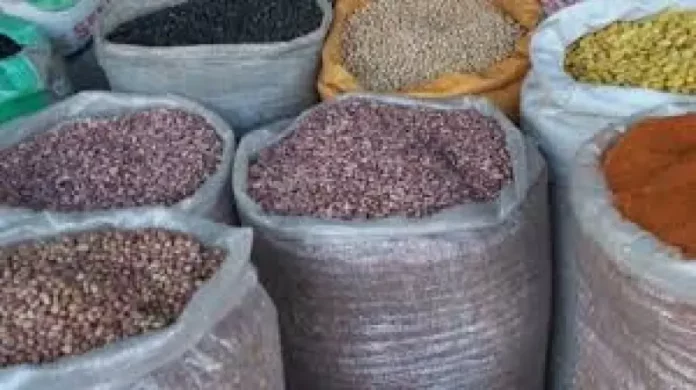In a welcome turn of events, Lagos residents and foodstuff traders are celebrating a significant drop in the price of beans, a key staple in Nigerian households. This price decrease, which follows months of sharp increases, is being attributed to the recent harvests of beans from the northern regions of Nigeria.
The price of beans, which had soared to as high as N150,000 per 100kg bag during the past few months due to shortages, has recently dropped to between N100,000 and N120,000. This shift in prices has been described by traders and consumers alike as a much-needed relief, particularly as the festive season approaches.
Traders Speak on Price Reduction
At Agege Market, one of Lagos’ busiest foodstuff hubs, foodstuff trader Mr. Yakubu Ahmed shared that the drop in prices is primarily due to a new harvest from the northern part of the country.
“We’ve seen a slight but much-needed drop in beans prices in the last two weeks. For several months, beans prices were climbing due to a supply shortage, but now things are looking better,” Ahmed explained.
According to him, the fresh beans harvest has significantly increased supply, easing the strain on prices. “For instance, a paint bucket of honey beans (Oloyin) was previously going for about N12,000, but now it’s down to between N8,000 and N9,000. We’ve also noticed that the mini honey beans price has dropped to N6,500 from N8,500.”
While traders like Ahmed express cautious optimism, he also cautioned that the price reduction has not been dramatic enough to completely ease the burden on consumers. “It’s a relief, but it’s not a drastic change. Consumers are still feeling the pinch, but we hope it continues to drop in the coming weeks,” he added.
Unpredictable Market Forces
Across town in the Iyana-Ipaja area, Mr. John Nwabueze, another foodstuff trader, expressed uncertainty about the underlying reasons for the price reduction. While acknowledging the decline in the price of beans, Nwabueze admitted that the factors influencing these fluctuations remain unclear.
“I can’t say exactly why prices have gone down. No one really knows why beans became so expensive a few months ago,” Nwabueze stated. “For instance, a bag of drum beans that sold for N140,000 just three months ago is now priced at about N120,000. It’s better, but we remain cautious because food prices in Nigeria are notoriously unpredictable.”
Despite the uncertainty, Nwabueze remains hopeful that the trend will continue, particularly as the holiday season nears, a period typically marked by price hikes. “We just hope prices don’t increase again during Christmas. It’s difficult to predict, but we are thankful for this drop.”
Consumers Celebrate, Yet Remain Cautious
For many Lagosians, the drop in beans prices comes as a pleasant surprise. Mrs. Cornelia Edet, a resident from Ketu-Ikosi, expressed her relief over the price reduction. “When the prices of beans went up, I had to cut down on the quantity I was buying. A paint bucket of honey beans was going for as high as N16,000, so I started buying half that amount,” Edet recounted.
However, she shared that her most recent purchase, just last week, was priced at N10,000 for the same quantity of beans. “I’m so glad that the prices are finally coming down,” she added with a smile.
Similarly, Mrs. Sandra Obalelenge, a housewife from the Dopemu area, had heard about the drop in prices after she had already made a purchase at the higher price of N10,500 two weeks ago. “I’m glad to see that the same paint bucket of beans now costs between N7,500 and N8,000. I’m planning to go and buy some more before prices go up again,” Obalelenge said, eager to take advantage of the lower prices.
Many consumers have expressed their hopes that the price reduction will persist, especially as they prepare for the Christmas season. However, the prevailing uncertainty in the food market means that many are treading carefully, opting to stock up now rather than risk higher prices later.
The Bigger Picture: Supply, Demand, and Regional Challenges
The fluctuation in beans prices is not just an isolated incident but part of a broader trend of price volatility in Nigeria’s food market. According to industry experts, beans, like many other foodstuffs, is subject to the forces of supply and demand, as well as the impact of regional agricultural challenges. Nigeria’s northern regions are the primary producers of beans, and disruptions in these areas – whether due to weather, transportation issues, or even socio-political instability – can lead to sharp price fluctuations in the southern markets.
A recent report by the National Bureau of Statistics (NBS) revealed that food inflation in Nigeria remains persistently high, driven in part by production challenges and logistics bottlenecks. While the harvest has increased supply this season, it’s unclear whether this trend will continue into the new year.
The increasing demand for beans, particularly during festive periods like Christmas and Easter, also contributes to price hikes. Historically, beans are an essential part of Nigerian meals, and any disruption in their supply can have significant impacts on the broader food market.
Looking Ahead: A Season of Hope or More Uncertainty?
With the holiday season fast approaching, Lagosians and foodstuff traders alike are watching the market closely, hoping that the recent price reduction signals the beginning of a more stable period for the beans market.
For consumers, especially those living on fixed incomes, the drop in price offers a small yet meaningful reprieve. “It may not be a huge change, but it’s enough to ease the strain on our budgets for now,” said Mrs. Edet.
As for traders, the fluctuating prices have become a familiar challenge. While many are grateful for the price drop, they remain wary of the unpredictable nature of the food market. “At this point, we take things one day at a time,” said Mr. Ahmed, his voice tinged with cautious optimism.

